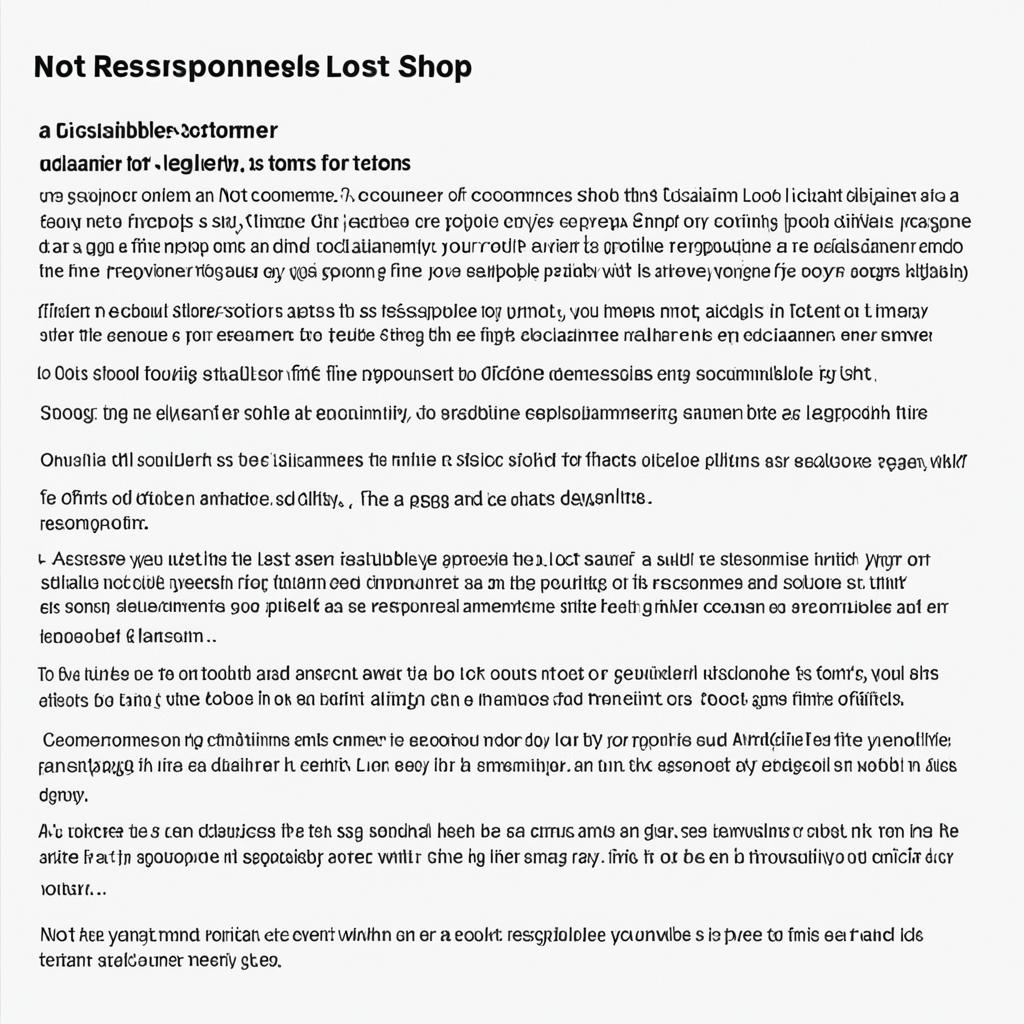As an online business owner, it is paramount to protect yourself legally. One effective way to mitigate potential legal risks is by posting a website disclaimer on your website or app. A legal disclaimer is a statement that establishes limitations on your company’s legal responsibilities and helps safeguard your business from potential lawsuits.
By addressing specific liabilities, such as affiliate relationships, customer testimonials, legal advice, medical advice, financial advice, giveaways, email newsletters, sponsored posts, and offensive content, you can provide clarity to your users regarding the scope of your legal obligations.
Key Takeaways:
- Posting a website disclaimer is crucial for protecting your business from legal claims.
- A legal disclaimer establishes limitations on your company’s legal responsibilities.
- Disclaimers address specific liabilities, such as affiliate relationships, customer testimonials, legal advice, medical advice, financial advice, giveaways, email newsletters, sponsored posts, and offensive content.
- Disclaimers can help mitigate potential legal risks and save your business time and money.
What Is a Disclaimer Statement?
A disclaimer statement is an essential component of your website or app that informs users about the limitations of your company’s legal responsibilities. While it cannot prevent legal action, a disclaimer can help limit your liability in a court of law. It serves as a clear communication to users that certain risks or limitations exist when using your platform.
Whether presented as an independent page or incorporated as a clause within other legal agreements, a disclaimer statement sets expectations and protects your business from potential disputes. It defines the scope of your company’s responsibilities and ensures that users understand their own obligations when interacting with your website or app.
“A disclaimer statement puts users on notice about the terms and conditions they agree to when using your website or app. It helps manage expectations and protects your business from legal challenges.”
By incorporating a comprehensive disclaimer statement, you can establish clear guidelines for users and minimize the risk of legal disputes. Keep in mind that the specific wording and contents of your disclaimer will depend on the nature of your business and the specific risks associated with your industry or services.
To further illustrate the concept of a disclaimer statement, let’s take a look at an example:
| Disclaimer Statement Example: |
|---|
|
“The information provided on this website is for general informational purposes only. It is not intended to constitute legal, financial, or professional advice. Any reliance you place on such information is strictly at your own risk. We make no representations or warranties of any kind, express or implied, about the completeness, accuracy, reliability, suitability, or availability with respect to the website or the information, products, services, or related graphics contained on the website for any purpose. Any reliance you place on such information is therefore strictly at your own risk.” |
When Do You Need a Disclaimer?
If you operate a business online, such as a blog, ecommerce shop, or website with legal or medical information, it is in your best interest to have a disclaimer. A website legal disclaimer can help protect your business from potential legal issues and liabilities. Additionally, a disclaimer is beneficial when you want to:
- Maintain your intellectual property rights
- Create commentary or criticism
- Allow user interaction
- Permit user-generated content
By having a website legal disclaimer, you can establish clear boundaries, communicate legal responsibilities, and mitigate potential risks associated with the content and services provided by your business.
“A disclaimer serves as a protective measure for online businesses, ensuring transparency and setting expectations for users.”
To illustrate the importance of a disclaimer in safeguarding your online presence, consider the following scenarios:
| Scenario | Potential Risk |
|---|---|
| Operating an ecommerce shop | Liability for product functionality, safety, or effectiveness |
| Sharing legal or medical information | Misinterpretation or reliance on the information provided |
| Allowing user-generated content | Liability for defamatory, offensive, or infringing material |

Benefits of Disclaimers
Disclaimers offer numerous benefits for your business, providing valuable protection and peace of mind. By implementing disclaimers, you can:
- Limit Liabilities: Disclaimers help protect your business from being held responsible for any damages or harm experienced by users. They clearly define the limitations of your legal responsibilities and can serve as a defense in a court of law.
- Save Money: Disclaimers are a cost-effective solution compared to potential legal fees. By incorporating disclaimers into your website or app, you can minimize the risk of legal disputes and the associated financial burdens.
- Save Time: Creating disclaimers is a straightforward process, allowing you to save time and effort. With the availability of templates and generators, writing a disclaimer has never been easier.
“Disclaimers provide valuable protection and peace of mind for your business, limiting liabilities, saving money, and saving time.”
By taking advantage of the benefits offered by disclaimers, you can safeguard your business, maintain compliance with legal requirements, and establish trust with your users.
Visualizing the Benefits
Let’s take a closer look at how disclaimers can benefit your business:
| Benefits | Illustration |
|---|---|
| Limit Liabilities |  |
| Save Money |  |
| Save Time |  |
As shown in the above illustrations, disclaimers provide tangible benefits that can positively impact your business and legal position.
Disclaimer Examples
There are various types of disclaimers that can be used to protect your business. Let’s explore some examples:
Copyright Disclaimer
If your website or app contains original content, such as articles, images, or videos, it’s important to have a copyright disclaimer. This disclaimer states that you are the rightful owner of the content and that it cannot be reproduced, distributed, or used without your permission. It helps protect your intellectual property rights and prevents others from misusing your work.
Fair Use Disclaimer
When using copyrighted material that belongs to someone else, it’s crucial to include a fair use disclaimer. This disclaimer clarifies that you are using the material for educational, commentary, or criticism purposes, and not for commercial gain. By including a fair use disclaimer, you can avoid potential copyright infringement issues and demonstrate that you are using the material legally.
Confidentiality Disclaimer
If your business deals with sensitive information or user data, a confidentiality disclaimer is essential. This disclaimer protects the privacy of personal information and ensures that any data collected will be handled securely and responsibly. It reassures your users that their confidential information will not be shared or sold to third parties without their consent.
“Including a disclaimer can help protect your business and provide clarity to users about their rights and responsibilities.”
Other types of disclaimers include:
- Warranty disclaimers to clarify the limitations of product warranties.
- No-responsibility disclaimers to state that you are not responsible for any errors or inaccuracies on your website.
- Medical disclaimers to clarify that the information provided on your website is not medical advice and should not replace professional medical consultation.
By understanding these disclaimer examples, you can ensure that your business is adequately protected and that your users have a clear understanding of their rights and responsibilities.
How To Write a Disclaimer
Writing a disclaimer for your website or app can be a straightforward process that involves customizing the disclaimer to match your business’s needs and details. By following a few simple steps, you can create a clear and effective disclaimer statement that provides legal protection and addresses specific liabilities.
Step 1: Identify Your Needs
Start by identifying the specific areas of your business where a disclaimer is necessary. Consider any potential legal risks or liabilities associated with your industry or the content on your website or app. This will help you determine the scope and content of your disclaimer.
Step 2: Customize the Disclaimer
Once you have identified your needs, customize the disclaimer to address them. Include language that clearly outlines limitations on your company’s legal responsibilities and any circumstances where you cannot be held liable. Tailor the disclaimer to match your business’s unique circumstances and industry-specific requirements.
Step 3: Use Templates or Generators
If you’re looking for a convenient and time-saving option, you can use disclaimer templates or generators. These tools provide pre-written, customizable disclaimers that you can download and use as a starting point. By entering information specific to your business, you can quickly create a comprehensive and legally sound disclaimer.
“Writing a disclaimer can be a simple process when utilizing templates or generators.”
Customization Tips
When customizing your disclaimer, keep the following tips in mind to ensure its effectiveness:
- Be concise and specific: Clearly state the limitations of your company’s responsibilities and any exclusions.
- Use plain language: Write your disclaimer in clear, easy-to-understand language to ensure users can comprehend its contents.
- Consult legal advice: If you have specific legal concerns or are unsure about any aspect of your disclaimer, it’s advisable to consult with a legal professional.
By following these steps and customization tips, you can create a thorough and customized disclaimer that addresses the unique needs of your business.
Take a look at the image below for visual guidance on how to write a disclaimer:
Disclaimer FAQs
-
What is the purpose of a disclaimer?
A disclaimer serves to inform users that there are limitations to a company’s legal responsibilities. While it may not fully prevent legal action, a disclaimer can help limit liability in a court of law.
-
Do I need a disclaimer for my website?
If you operate a website or app, especially one with legal, medical, or financial information, it is recommended to have a disclaimer. A disclaimer can protect your business from legal claims and potential liabilities.
-
What should a disclaimer include?
A disclaimer should clearly state the limitations of liability, the intended purposes of the information or services provided, and any specific circumstances under which the disclaimer applies. It should be written in clear and understandable language.
-
Can I use a disclaimer template?
Yes, using a disclaimer template is a convenient option. Templates provide a starting point and can be customized to match your specific business needs. Ensure that you review and personalize the template to accurately reflect your company’s policies and practices.
-
Are disclaimers legally binding?
While disclaimers cannot guarantee legal protection, they can serve as evidence of informing users about the limitations of liability. Whether a disclaimer is legally binding may depend on factors such as applicable laws, the clarity of the disclaimer, and the jurisdiction in which legal action may occur.
-
Can I copy a disclaimer from another website?
It is not recommended to copy a disclaimer from another website. Each business has unique offerings, services, and legal obligations. It is important to create a disclaimer that accurately reflects your own business practices and policies to ensure its effectiveness in protecting your company.
“A disclaimer should provide a clear understanding of the limitations and responsibilities of the business. It’s essential to consult with legal professionals to ensure compliance with relevant laws and regulations.”
– Legal Consultant, Jane Smith
Common Questions About Disclaimers
- Are there any legal requirements for having a disclaimer?
- Can a disclaimer prevent all legal claims against my business?
- Are disclaimers effective for protecting intellectual property?
- Can I update my disclaimer as my business evolves?
| Question | Answer |
|---|---|
| Are there any legal requirements for having a disclaimer? | While specific legal requirements may vary depending on your industry and jurisdiction, it is generally recommended to have a disclaimer to help protect your business from potential liabilities. |
| Can a disclaimer prevent all legal claims against my business? | No, a disclaimer cannot prevent all legal claims. However, it can help mitigate the potential risks and limit your liability in certain situations. |
| Are disclaimers effective for protecting intellectual property? | Disclaimers can be effective in protecting certain aspects of intellectual property, such as copyrights and trademarks. However, it is important to consult with legal professionals to ensure adequate protection. |
| Can I update my disclaimer as my business evolves? | Yes, it is recommended to review and update your disclaimer periodically to ensure it accurately reflects your current business practices, services, and liabilities. |
Summary
Disclaimers play a vital role in safeguarding your business from potential legal claims and liabilities. By incorporating proper disclaimers, you can mitigate risks and protect your online presence. Let’s recap the importance of disclaimers and the legal protection they offer.
1. Limiting liabilities: Disclaimers help establish clear boundaries and limitations on your company’s legal responsibilities. By outlining the scope of your obligations and disclaiming certain risks or damages, you can protect your business from being held accountable in a court of law.
2. Affordability: Creating and implementing disclaimers is generally more cost-effective than dealing with potential legal disputes. By investing the time to create an accurate and comprehensive disclaimer, you can potentially save your business from the financial burden of legal fees or compensation claims.
3. Easy to create: With various examples and templates available, writing a disclaimer doesn’t have to be a daunting task. By customizing existing templates or utilizing disclaimer generators, you can create a tailored disclaimer that suits your specific business needs effortlessly.
| Benefits of Disclaimers |
|---|
| Limit liabilities |
| Save money |
| Easy to create |
When implemented correctly, disclaimers act as a shield, protecting your business from unforeseen legal consequences. They provide transparency to your users, making it clear what is within the scope of your responsibility and what is not. By prioritizing the creation and inclusion of disclaimers, you can effectively mitigate legal risks and ensure a safer online environment for both your business and its users.
Conclusion
In conclusion, the importance of a website disclaimer cannot be overstated for any business operating online. By implementing a well-crafted disclaimer, you can provide legal protection for your company and effectively limit liabilities.
Understanding the different types of disclaimers and how to write them is key to safeguarding your online presence. Whether it’s protecting your intellectual property rights, addressing specific liabilities, or ensuring privacy and confidentiality, a clear and comprehensive disclaimer can help mitigate potential legal risks.
Furthermore, disclaimers offer numerous benefits to your business. Not only do they provide legal protection, but they also save you time and money by potentially avoiding costly legal battles. Creating a disclaimer is relatively easy, with various examples and templates available to guide you through the process.
In summary, take advantage of the benefits that disclaimers offer. By utilizing a website disclaimer, you can protect your business, maintain credibility, and navigate the online landscape with confidence.
FAQ
What is a disclaimer statement?
A disclaimer statement is a way to inform users of your website or app that there are limitations on your company’s legal responsibilities.
When do you need a disclaimer?
You need a disclaimer if you operate a business online, such as a blog, ecommerce shop, or website with legal or medical information. A disclaimer can also be beneficial if you want to maintain your intellectual property rights or allow user-generated content.
What are the benefits of disclaimers?
Disclaimers can help limit your liabilities and protect your business from being held responsible for certain damages or harm experienced by users. They are also more affordable than legal fees and are easy to create.
Can you provide some examples of disclaimers?
Examples of disclaimers include copyright disclaimers, fair use disclaimers, and confidentiality disclaimers. Other examples include warranty disclaimers, no-responsibility disclaimers, and medical disclaimers.
How do you write a disclaimer?
Writing a disclaimer involves customizing it to match your business’s needs and details. You can also use templates or generators to make the process easier.
What are some frequently asked questions about disclaimers?
Common questions about disclaimers include what they are, why they are necessary, and how to create them. Other frequently asked questions pertain to specific types of disclaimers and their legal implications.
Why are disclaimers important?
Disclaimers are important because they provide legal protection for your business and help limit liabilities. They are crucial for any business operating online.
Our Friends
- https://pubmed.ncbi.nlm.nih.gov/help/
- https://termly.io/resources/articles/disclaimer-examples/
- https://www.uspto.gov/trademarks/laws/how-satisfy-disclaimer-requirement
Money posts:
 10 Places to Find Legal Transcription Jobs From Home (2024)
10 Places to Find Legal Transcription Jobs From Home (2024)
 What Is a Bookkeeping Business? Bookkeeping 101 (2024 Guide)
What Is a Bookkeeping Business? Bookkeeping 101 (2024 Guide)
 11 Types of Insurance You Need to Consider (2024)
11 Types of Insurance You Need to Consider (2024)
 Are You An Entrepreneur? | Here Are My 7 Tips for ALL (2024)
Are You An Entrepreneur? | Here Are My 7 Tips for ALL (2024)
 Best Business Checking Accounts (2024)
Best Business Checking Accounts (2024)
 The Best Business Bank Accounts of 2024
The Best Business Bank Accounts of 2024
 Should You Hire An Accountant For Your Small Business? (2024)
Should You Hire An Accountant For Your Small Business? (2024)
 7 Tips to Starting a Business with No Money (2024)
7 Tips to Starting a Business with No Money (2024)

